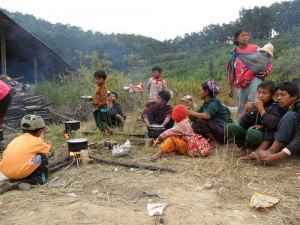Posts Tagged ‘Refugees’ (118 found)
Karenni Civil Society Warns Myanmar Government to Stop Undermining Peace Process
A briefing paper by the Karenni Civil Society Network (KCSN) issued today warns how the Myanmar government’s failure to adhere to ceasefire agreements with the Karenni National Progressive Party (KNPP) is undermining the peace process.
The government has failed to keep various agreements signed with KNPP on March 7 and June 9 of this year, including informing KNPP of its troop movements through Karenni territory, which led to an outbreak of fighting in June […]
• • •Rohingya in Bangladesh: Maintaining the Status Quo; Squandering a Rare Opportunity
For decades, Burmese Rohingya fleeing persecution have sought refuge in Bangladesh. June’s inter-communal violence in Burma’s Rakhine State, as well as subsequent state-sponsored persecution and targeted attacks against Muslim populations […]
• • •Rohingya in Burma: Spotlight on Current Crisis Offers Opportunity for Progress
Despite an abundance of natural resources, Rakhine State is the second-poorest state in Burma. The simmering tension that exists between the Rakhine and stateless Rohingya communities has been stoked by poverty for decades. However, in June 2012 that tension boiled over […]
• • •Refugee Return Only with Consent, Safety and Dignity
 Anxiety and uncertainty has been building among refugees in Thailand’s camps regarding possible repatriation to Burma. While there are many actors who feel they have a major role in the decision-making of when and how this process will take place, none are more important than the refugees themselves. Thus, the release of a position paper by a group of Karen Community Based Organizations (KCBOs), many of whom work directly with communities inside Thailand’s refugee camps, is an important first step in making sure that it is those affected who determine the path that their lives will take.
Anxiety and uncertainty has been building among refugees in Thailand’s camps regarding possible repatriation to Burma. While there are many actors who feel they have a major role in the decision-making of when and how this process will take place, none are more important than the refugees themselves. Thus, the release of a position paper by a group of Karen Community Based Organizations (KCBOs), many of whom work directly with communities inside Thailand’s refugee camps, is an important first step in making sure that it is those affected who determine the path that their lives will take.
The position paper outlines pre-conditions for refugees’ return to Burma and the processes that must be followed once those preconditions have been met. The position paper is timely in that it was released the same week that the Thai National Security Council released a statement indicating that refugees will return within a year. Burma, the statement reads, “is clearing landmines along the borders, preparing to build shelters and other infrastructure… to be ready within one year.” […]
• • •Ad Hoc and Inadequate
Thailand’s Treatment of Refugees and Asylum Seekers
Thailand: Refugee Policies Ad Hoc and Inadequate
Closed Camps, No Work Authorization Lead to Stagnation and Abuse
Thailand’s policies governing refugees on its soil are making them vulnerable to arbitrary and abusive treatment despite the country’s decades of experience as host for millions of refugees […]
• • •Karen Community Based Organizations Release Position Paper on Refugees’ Return
Today a grouping of Karen Community Based Organizations (KCBOs) released their collective position in response to recent news about the repatriation of refugees. The position paper outlines the pre-conditions and processes necessary for a successful and voluntary return of refugees from several camps along the Thai-Burma border […]
• • •Karen Community Based Organizations’ Position on Refugees’ Return to Burma
This is a preliminary working paper prepared by the Karen Community Based Organizations (KCBOs) concerned with refugees’ repatriation and return to Burma […]
• • •China: Stop Expelling Refugees
Forced Return of Kachin to Burma Violates International Law
In late August 2012, the Chinese government forcibly returned at least 4,000 ethnic Kachin refugees to a conflict zone in northern Burma in violation of international law, Human Rights Watch said in a letter to the Chinese Ministry of Foreign Affairs today.
Human Rights Watch said that the Chinese government carried out the forced returns without having provided the Kachin refugees a process for determining their claims to refugee status […]
• • •Shan Community Groups: Don’t Push Refugees Back into Active War Zone
Shan community groups are gravely concerned about imminent repatriation of over 500 refugees from a camp on the northern Thai border into an area of active conflict.
Today, the Norwegian Refugee Council, contracted under the Norwegian-led “Myanmar Peace Support Initiative,” will begin house-to-house surveys of refugees in Koung Jor camp, northern Chiang Mai province, about their willingness to return […]
• • •








 All posts
All posts